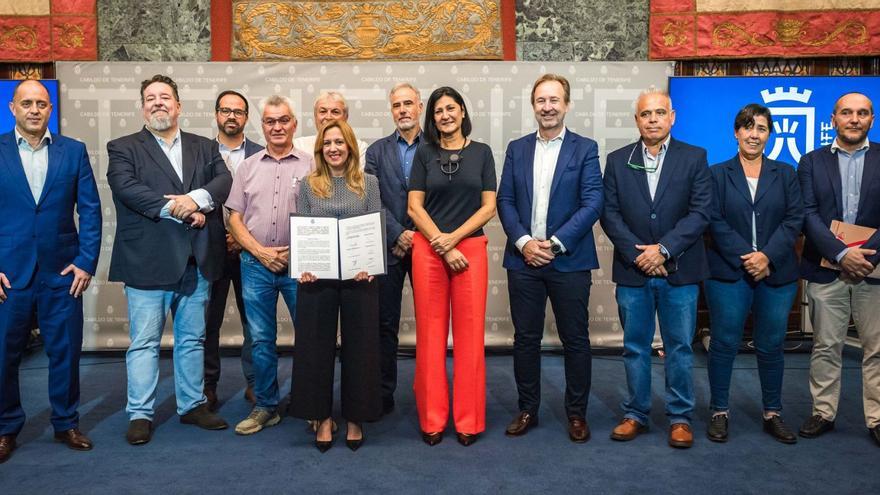
Nine freight transport and reception companiesthe majority private – the exceptions are the public Sinpromi and ECIT, which is dedicated to waste removal – signed this Tuesday with the Tenerife Council he commitment to remove one hundred heavy trucks or buses from the highways during rush hours to alleviate the recurring traffic collapse. The document, open to new accessions, proposes improving sustainable mobility on the Island with measures similar to that of removing heavy vehicles between six and ten in the morning on weekdays.
The signature commits in a collaboration agreement without financial compensation to the insular Corporation and the Martínez Cano companies Canary Islands, which was the pioneer a couple of months ago; Ewaste Canarias; Trec SL; Apelles Cleaning; El Trompo Shopping Multicenter; Transportes Interisulares Carballo and Grupo Fumero Logistics Operators, as well as the aforementioned entities dependent on the Cabildo.
The agreement was signed by the president of the Cabildo, Rosa Davilaaccompanied by the advisors of Sustainability, Blanca Pérez, and Mobility, Eulalia García, as well as business representatives.
“These companies are directly committed to their Island,” Dávila noted, adding: “At first we set an example by taking the initiative to remove waste vehicles.” He concluded: «Together there are about 100 vehicles that are multiplied by the number of trips.». Dávila included the agreement within the framework of the Cabildo’s strategy of “not standing by” while waiting for the construction of new roads. He argued: “Without changes to mobility, the future third rail will immediately collapse.” Dávila described the agreement as a “seal of quality” for the companies that are committed and thanked them for changing the logistics structure for the benefit of society.
Eulalia García stressed that “the commitment to alleviate mobility problems must be collective and with this initiative companies gain efficiency and productivity, in addition to contributing to the improvement of the environment.”
After the signing, some company representatives showed their support for the initiative to regulate heavy traffic during peak hours. Martínez Cano’s manager, Francisco Alberto Medina, recalled that his company was the first to join and stated that since it was implemented “the family and work conciliation of our employees and the carbon footprint has been reduced. From Ewaste Canarias, Íñigo Núñez thanked the initiative, since “it is not always the companies that ask and we are delighted.” The head of Dormitorum, Jesús del Amo, emphasized “public-private collaboration.”
The El Trompo Shopping Center also joined the agreement. Its manager, Ambrosio Jiménez, explained that they have decided to receive the merchandise before 7:00 a.m. and go to the loading docks from 10:00 a.m., which is “an eco-sustainable measure given that the trucks spend less time in the road and reduce fuel consumption.
The agreement signed with the Cabildo commits companies to regulate the departure times of heavy traffic from their facilities to minimize problems on the North (TF-5) and South (TF-1) highways during peak hours. of vehicles, between 6:00 and 10:00 hours. A calendar of follow-up meetings is also established to assess the result of the measure.
















